Bio 1111 - Study guides, Class notes & Summaries
Looking for the best study guides, study notes and summaries about Bio 1111? On this page you'll find 306 study documents about Bio 1111.
Page 3 out of 306 results
Sort by
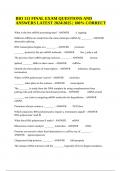
-
BIO 111 FINAL EXAM QUESTIONS AND ANSWERS LATEST 2024/2025 | 100% CORRECT
- Exam (elaborations) • 12 pages • 2024
-
- $15.49
- + learn more
BIO 111 FINAL EXAM QUESTIONS AND ANSWERS LATEST 2024/2025 | 100% CORRECT. What is the first mRNA processing step? - ANSWER 5' capping Different mRNAs are made from the same initial pre-mRNA by ________. - ANSWER alternative splicing RNA transcription begins at a ________. - ANSWER promoter ________ protect(s) the pre-mRNA molecule. - ANSWER the 3' poly-a tail The process of pre-mRNA splicing removes ________. - ANSWER introns Spliced ________ differ in their exons. - ANSWER mRNAs Identi...
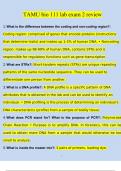
-
TAMU bio 111 lab exam 2 review (2023/2024) already passed Geaded A+
- Exam (elaborations) • 18 pages • 2024
-
- $12.99
- + learn more
TAMU bio 111 lab exam 2 review (2023/2024) already passed What is the difference between the coding and non-coding region? Coding region: comprised of genes that encode proteins (instructions that determine traits) and makes up 1-2% of human DNA. • Noncoding region: makes up 98-99% of human DNA, contains STRs and is responsible for regulatory functions such as gene transcription. What are STRs? Short-tandem repeats (STRs) are unique repeating patterns of the same nucleotide sequence. They can ...
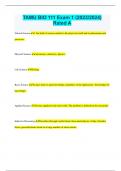
-
TAMU BIO 111 Exam 1 (2023/2024) Rated A
- Exam (elaborations) • 16 pages • 2023
- Available in package deal
-
- $9.99
- + learn more
TAMU BIO 111 Exam 1 (2023/2024) Rated A Natural Science · the field of science related to the physical world and its phenomena and processes. Physical Science astronomy, chemistry, physics Life Science Biology Basic Science Science done to gain knowledge, regardless of the application. "knowledge for knowledge" Applied Science Science applied to the real world. The problem is defined by the researcher Inductive Reasoning Describes through careful observation and analysis of data. Scienti...
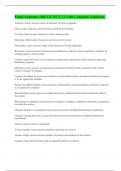
-
Final-Anatomy (Bio 111 WCC) || with Complete Solutions.
- Exam (elaborations) • 7 pages • 2024
-
- $10.89
- + learn more
Anatomy correct answers study of structure of living organisms Microscopic Anatomy correct answers small body structures Cytology (Microscopic Anatomy) correct answers cells Histology (Microscopic Anatomy) correct answers tissues Physiology correct answers study of the function of living organisms Receptors correct answers a homeostatic mechanism in which a sensor responds to stimulus by sending input to control center Control Center/Set Point correct answers a homeostatic mech...
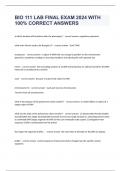
-
BIO 111 LAB FINAL EXAM 2024 WITH 100% CORRECT ANSWERS
- Exam (elaborations) • 10 pages • 2024
-
- $16.49
- + learn more
at which location will insertions alter the phenotype? - correct answer regulatory sequences what were introns used to be thought of? - correct answer "junk" DNA transposon - correct answer a region of DNA that can change its position on the chromosome (genome), sometimes creating or reversing mutations and altering the cell's genome size intron - correct answer the noncoding sections of an RNA transcript that are spliced out before the RNA molecule is translated into a prote...
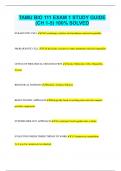
-
TAMU BIO 111 EXAM 1 STUDY GUIDE (CH 1-5) 100% SOLVED
- Exam (elaborations) • 18 pages • 2023
- Available in package deal
-
- $9.99
- + learn more
TAMU BIO 111 EXAM 1 STUDY GUIDE (CH 1-5) 100% SOLVED EUKARYOTIC CELL Cell containing a nucleus and membrane-enclosed organelles PROKARYOTIC CELL Cell that lacks a nucleus or other membrane-enclosed organelles LEVELS OF BIOLOGICAL ORGANIZATION Atoms, Molecules, Cells, Organelles, Tissues BIOLOGICAL DOMAINS Bacteria, Archaea, Eukarya REDUCTIONIST APPROACH Biologically break everything down into the simplest possible components SYSTEMS BIOLOGY APPROACH Tie small parts back together into a whol...
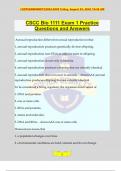
-
CSCC Bio 1111 Exam 1 Practice Questions and Answers
- Exam (elaborations) • 31 pages • 2024
-
- $9.99
- + learn more
CSCC Bio 1111 Exam 1 Practice Questions and Answers Asexual reproduction differs from sexual reproduction in that 1. asexual reproduction produces genetically diverse offspring. 2. asexual reproduction uses DNA to code for traits in offspring. 3. asexual reproduction occurs only in bacteria. 4. asexual reproduction produces offspring that are virtually identical. 5. asexual reproduction does not occur in animals. - Answer️️ -asexual reproduction produces offspring that are virtually ...
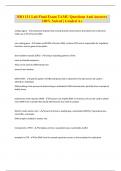
-
BIO 111 Lab Final Exam TAMU Questions And Answers 100% Solved | Graded A+
- Exam (elaborations) • 11 pages • 2024
- Available in package deal
-
- $11.08
- + learn more
BIO 111 Lab Final Exam TAMU Questions And Answers 100% Solved | Graded A+ coding region - comprised of genes that encode proteins (instructions that determine traits) and makes up 1-2% of human DNA. non-coding gene - makes up 98-99% of human DNA, contains STRs and is responsible for regulatory functions such as gene transcription short tandem repeats (STRs) - unique repeating patterns of the same nucleotide sequence. They can be used to differentiate one person from another. DNA Profil...
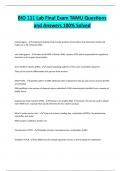
-
BIO 111 Lab Final Exam TAMU Questions and Answers 100% Solved
- Exam (elaborations) • 11 pages • 2024
- Available in package deal
-
- $13.99
- + learn more
BIO 111 Lab Final Exam TAMU Questions and Answers 100% Solved coding region - comprised of genes that encode proteins (instructions that determine traits) and makes up 1-2% of human DNA. non-coding gene - makes up 98-99% of human DNA, contains STRs and is responsible for regulatory functions such as gene transcription short tandem repeats (STRs) - unique repeating patterns of the same nucleotide sequence. They can be used to differentiate one person from another. DNA Profile - spe...

-
PURDUE BIO 111 EXAM 1 2024 WITH 100% CORRECT ANSWERS
- Exam (elaborations) • 10 pages • 2024
-
- $17.49
- + learn more
Which process describes cell division in prokaryotic organisms?Answer - binary fission What is the term used to describe about 150 nucleotides of DNA wrapped around a core of histone proteins?Answer - nucleosome Meiotic cell division plays a key role in which biological processes?Answer - sexual reproduction During the G1 phase of the cell cycle, most of the DNA would be in what state of compaction?Answer - 30-nm fiber During telophase of mitosis, how many DNA double helices make...

Study stress? For sellers on Stuvia, these are actually golden times. KA-CHING! Earn from your study resources too and start uploading now. Discover all about earning on Stuvia


